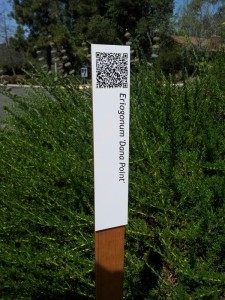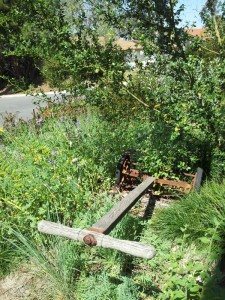Part of this weekend’s tasks was to help install signage at a couple of the gardens that will be on the Garden Native garden tour this weekend. How many times have you gone to a garden and seen the perfect plant, but you no have idea what it is and there’s nobody around to ask? That’s exactly the scenario the organizers are trying to avoid.

The signs have the name of the plant, but they also have this little handy QR code at the top. When you read the QR code with a smart phone you’re transported to a PDF with more information–and usually, photos–of the plant, with notes on things like the plant’s eventual size, its water needs and often with notes on how to use it in the garden. These PDF files are downloaded to the user’s device, so they can have a record of what they’ve viewed. Unless your cell phone reception is really poor or you have a limited data plan–or have no smart phone at all–this arrangement works really well.

Who wouldn’t want to know the name of the perky yellow San Diego sunflower in the distance?

Of course not everything requires a sign. If you have an old lawnmower, but have native plants instead of a lawn, what do you do? How about making some garden art out of the old lawnmower? Brilliant.
It’s interesting to see how many uses these QR codes are being put to. They’re used all over for advertizing. And you’re starting to see them more frequently on interpretive signage, like here. I wasn’t responsible for making these signs, but even I haven’t been immune to using QR codes. In my case they’ve appeared in some artwork of the last couple of years.
Here’s a short video of a temporary installation I had up at the San Diego International Airport from May to December of last year. It’s simply titled Twenty-Two Flags. Each of the 22 flags has 33 QR codes, each with fragments of text from the Bardo Thodol, the Tibetan Book of the Dead, a book I’ve described elsewhere as a Fodor’s Guide to reincarnation and the afterlife.
Twenty-Two Flags (Bardo Thodol), 2014 from James SOE NYUN on Vimeo.
Add up all 22 flags and 660 QR codes and you have the entirety of the two books that make up this first-millennium text. Unlike the garden signs, the codes in my piece link directly to the text and don’t rely on using the web to connect to more content. Each QR code can be asked to store over 1200 different characters. That’s a lot of text!
The piece was part of a show looking at the art/science/tech interface. Something appealed to me about encoding a fairly ancient text that’s endured through the years using a very contemporary and most likely to be short-lived technology. In the end you can call me a bit of a Luddite. I love tech, but I don’t really entirely trust it. Give me a handwritten note, a letterpress book–or a plant. Those things I can trust.

For a Luddite, you came up with some pretty timely conceptual art, and visually exciting as well.
push mower with a wooden handle would have been a pleasure for this Luddite to use.